|
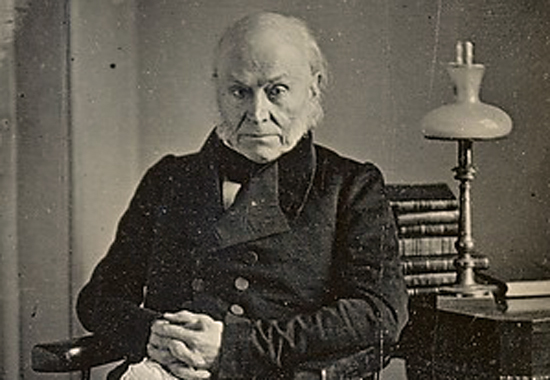
Old Man Eloquent: John Quincy Adams
ca. 1843
Last
Link to the Founding Fathers
John Quincy Adams lived 1767-1848.
He
served as the sixth president
of the United States from 1825-1829.
|
|
Image Above
John Quincy Adams
Copy by Southworth
& Hawes of a lost original daguerreotype by
Phillip Haas (active 1839-57), ca. 1843.
Scroll down for the entire image.
The Metropolitan
Museum of Art |
His
father, second U.S. president
 John Adams, must
have been pleased. His eldest son turned out to be a brilliant diplomat.
JQA's political career led him all the way to the presidency in 1825.
Interestingly, wisdom and experience
urged Adams Senior to remark,
John Adams, must
have been pleased. His eldest son turned out to be a brilliant diplomat.
JQA's political career led him all the way to the presidency in 1825.
Interestingly, wisdom and experience
urged Adams Senior to remark,
"No man
who ever held the office of President
would congratulate a
friend on obtaining it."
Thanks to an opposition that aimed to
frustrate, JQA's presidential
term was less successful than his time as Secretary of State
(1817-1825.)
Why Quincy?
His mother's
grandfather, Colonel John Quincy, died when wee John was born. He
inherited his name.
A part of Braintree, Massachusetts, JQA's birthplace, later
became the city of Quincy, in honor of the very Colonel.
Unlike that city of Quincy in
Massachusetts, the city of Quincy in Illinois was
actually named after John Quincy Adams.
John Quincy Adams'
Background, Life, and Family
John Quincy Adams was born on July 11, 1767, in Braintree (Quincy),
Massachusetts, and lived
a prolific 80 years.
His father was
John Adams, his mother Abigail Smith Adams.
They married in 1764.
JQA had three siblings:
Abigail ("Nabby" 1765-1813),
Charles (1770-1800), and
Thomas Boylston (1772-1832).
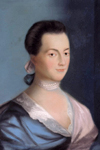
Abigail Smith Adams by Benjamin Blyth
Massachusetts Historical
Society
JQA's childhood years coincided with the
American Revolution (1775-1783.)
These
are times in which a genius would wish to
live. It is not in the still calm of life,
or in the repose of a pacific station, that
great challenges are formed. Great
necessities call out great virtues.
Abigail Adams
in a letter to her son John Quincy Adams,
January 19, 1780
Wee John Quincy was properly groomed for a diplomatic career, which
commenced when he was only 13 years old.
Adams worked as a lawyer, a professor of rhetoric and oratory at
Harvard College, and held several other jobs for the government
including French interpreter.
He was a hard worker, got out of bed between four and six o'clock in
the morning and often went for a walk around the city or for a swim
in the Potomac River before breakfast.
|
His wife, Louisa Catherine
Adams, née Johnson,
was born in London, England, which makes her the only First Lady born outside
the United States.
She
was raised in France and England,
played the harp and the piano, and
read Greek,
French,
and English literature.
She often accompanied
JQA on his
many travels. |
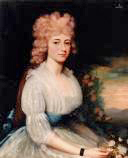
Louisa Catherine Adams
1775-1852 |
| |
|
|
|
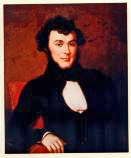
George Washington Adams
1801-1829 |
JQA's eldest son was
George Washington Adams.
George was born on April 12,
1801, in Berlin, Prussia.
He drowned in Long Island Sound on April
30, 1829, which might or might not have been suicide. |
| |
|
|
|
His second son was
John Adams II.
John Jr. was born on July 4, 1803, in
Boston.
He died from complications of alcoholism
on October 23,
1834. |
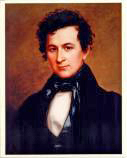
John Adams II
1803-1834 |
| |
|
|
|
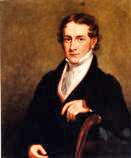
Charles Francis Adams
1807-1886 |
His third son was the diplomat
Charles Francis Adams.
Charles Francis was born on August
18, 1807,
in Boston.
He died in
Boston on November 21, 1886. |
A baby girl,
Louisa Catherine II, was born in August 1809, but died a
year later from dysentery.
Notable grandson via Charles Francis
Adams was
 Henry Adams
(1838-1918.)
Henry Adams
(1838-1918.)
John Quincy Adams'
Strong Points
Adams was an excellent speaker. They called him "Old Man Eloquent."
He used this skill alongside an iron determination to argue against slavery.
When, off the coast of Cuba in July
1839, a group of African slaves mutinied and later landed with the
captured Spanish vessel in a U.S. harbor,
John Quincy Adams agreed to join their lawyers, defended them in court and won their freedom.
They
didn't have to return to their owners, which would have meant
their certain death.
Hollywood was delighted.
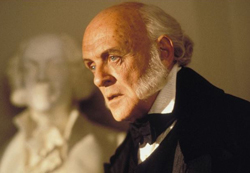
Anthony Hopkins is John Quincy
Adams in Amistad, 1997
© Dreamworks
And speaking of Adams' fight against slavery...
The Pro-Slavery
Gag Rule
In the 1830s, an avalanche of
anti-slavery petitions flooded Congress. According to the Capitol
Visitor Center,
Petitions were
so large Congress began referring to them by
weight rather than by source or title.
In one year alone, 130,000 petitions
were signed. And all in all, Congress received more than 2,000,000
signatures of citizens demanding to free slaves.
How did Congress deal with this?

In May 1836, a pro-slavery member of the
House of Representatives, Henry Laurens Pinckney of South Carolina,
introduced three resolutions to make sure the slaves didn't go
nowhere. One of these resolutions was the Gag Rule which would instantly gag
any anti-slavery petition as soon as it was received, thus keeping it off the floor. Debate or discussion of these
petitions were indefinitely postponed, and shelved as soon as they arrived.
Congress kept the Gag Rule
alive for each following session until
December 3, 1844, when it was repealed thanks to the constant
opposition of men like Joshua Reed Giddings of
Ohio and John Quincy Adams.
Adams, by now a Massachusetts Whig, deemed the gag rule "to be in
direct violation of the Constitution of the United States."
And Women's Rights
Arguing against slavery led directly to arguing for women's rights. How so?
When women petitioned to the House
against the annexation of Texas because it was pro-slavery, the
chairman of the Committee on Foreign Affairs,
Benjamin
Chew Howard of Maryland, "felt regret when petitions thus
signed were presented to the House relating to the political
matters."
"Thus signed" meant signed by women.
And Howard followed up with the following nugget:
He
thought that these females could have a
sufficient field for the exercise of their
influence in the discharge of their duties
to their fathers, their husbands, or their
children, cheering the domestic circle, and
shedding over it the mild radiance of the
social virtues, instead of rushing into the
fierce struggles of political life.
He felt
sorrow at this departure from their proper
sphere, in which there was abundant room for
the practice of the most extensive
benevolence and philanthropy, because he
considered it discreditable, not only to
their own particular section of the country,
but also to the national character, and thus
giving him a right to express this opinion.
In a nutshell, Howard felt that the women had
disgraced themselves and their country by presenting their
petitions.
John Quincy "Old Eloquent" Adams had a field day with Howard's
reasoning. He
replied:
I subscribe, fully, to the elegant
compliment passed by him upon those members of the female sex who
devote their time to these duties. But I say that the correct
principle is, that women are not only justified, but exhibit the
most exalted virtue when they do depart from the domestic circle,
and enter on the concerns of their country, of humanity, and of
their God.
Now to say, respecting women, that any
action of theirs was disgraceful, was more
than merely contesting their legal right so
to act: it was contesting the right of the
mind, of the soul, and the conscience.
Boom.
And why stop there. Inch by inch JQA dismantled, mocked, and exposed.
From June 16 to July 7, 1838, he mopped the floor with his
opponents' arguments regarding women's proper place, soon arriving at the
historic issue of votes for women.
And the right to petition... is to be denied
to women because they have no right to vote!
Is it so clear that they have no such right
as this last? And if not, who shall say that
this argument of the gentleman's is not
adding one injustice to another?
And back to slavery:
Europe
... point to us as a nation of liars and hypocrites, who
publish to the world that all men are born free and equal, and then
hold a large portion of our own population in bondage.
This is the
 Speech of JQA of Massachusetts, upon
the right of the people, men and women, to petition; on the freedom
of speech and of debate in the House of Representatives of the
United States; on the resolutions of seven state legislatures and
the petitions of more than one hundred thousand petitioners,
relating to the annexation of Texas to the Union.
Speech of JQA of Massachusetts, upon
the right of the people, men and women, to petition; on the freedom
of speech and of debate in the House of Representatives of the
United States; on the resolutions of seven state legislatures and
the petitions of more than one hundred thousand petitioners,
relating to the annexation of Texas to the Union.
Delivered in the House of Representatives of the United States, in
fragments of the morning hour, from the 16th of June to the 7th of
July, 1838, inclusive.
John Quincy Adams'
Weak Points
JQA was not very social and often
felt depressed.
What some people described as a high-minded, dignified, upright, patriotic, even noble
character, others interpreted as simply being cold and elitist, an
imperialist, and as generally having an aristocratic stick up him
bum.
This didn't work to his advantage
especially when he
was president.
John Quincy Adams'
Achievements
He was one of America's greatest diplomats.
John Quincy Adams led the American
delegation that negotiated the
 Treaty of Ghent in 1814, which
ended the
Treaty of Ghent in 1814, which
ended the
 War of 1812. Although, in a
letter to his wife written on January 13, 1815, Adams gave fellow
diplomat Albert Gallatin credits
for having contributed "the largest and most important share to the
conclusion of the peace."
War of 1812. Although, in a
letter to his wife written on January 13, 1815, Adams gave fellow
diplomat Albert Gallatin credits
for having contributed "the largest and most important share to the
conclusion of the peace."
As Secretary of State under
President Monroe, he arranged with England for the
joint occupation of the Oregon Country in 1818.
He negotiated the
 Transcontinental Treaty, also
called the Purchase of Florida, of 1819.
Transcontinental Treaty, also
called the Purchase of Florida, of 1819.
Adams further formulated what came to be
known as the
 Monroe
Doctrine, a warning to European powers to keep their
colonial ambitions away from the Americas. Monroe
Doctrine, a warning to European powers to keep their
colonial ambitions away from the Americas.
John Quincy Adams in
Presidential Elections
JQA was part of three presidential
elections:
:: 1820 Election
The 1820 presidential election was pretty straightforward. President James Monroe ran for a second term
completely unopposed. He won 231 out of 235 electoral votes. Why not
235 out of 235? Because three electors had died, and
William Plumer of New Hampshire voted for John Quincy
Adams, who didn't even run. Why? Because he could.
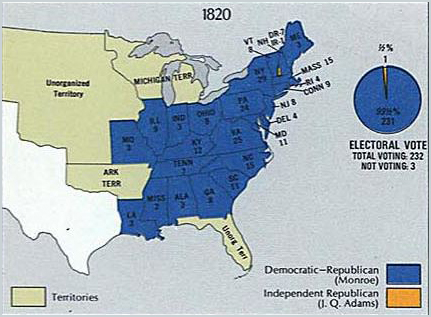
Electoral Votes of the
1820 Presidential Election
 Here is more on the 1820 Election
from the Library of Congress.
Here is more on the 1820 Election
from the Library of Congress.
:: 1824 Election
Also called the "corrupt bargain" election
by Jacksonians (followers of
 Andrew Jackson.)
How so?
Andrew Jackson.)
How so?
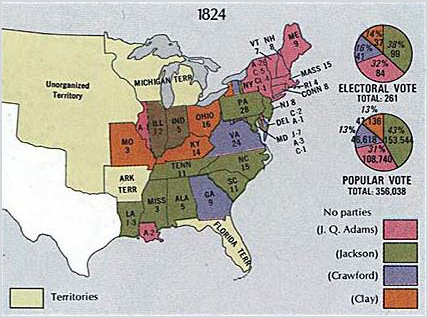
The 1824 Presidential
Election
No candidate having a majority in the
electoral college, the election had to be decided in the House of
Representatives where J.Q. Adams was chosen President.
According to the
 Twelfth Amendment of the
Constitution,
Twelfth Amendment of the
Constitution,
The person having the greatest number
of votes for President, shall be the President, if such number be a
majority of the whole number of Electors appointed; and if no person
have such majority, then from the persons having the highest numbers
not exceeding three on the list of those voted for as President, the
House of Representatives shall choose immediately, by ballot, the
President.
So, the "three on the list" with the "highest number" were Jackson,
Adams, and Crawford. Clay as the fourth on the list was out. So was Crawford
who,
unfortunately, suffered a severe
stroke that left him paralyzed and blind, which made it a race
between Jackson and Adams.
The House of Representatives had to
pick, and chose
Adams, who as soon as he became president, made Clay, the former
Speaker of the House, his Secretary of State.
The Jacksonians claimed this
stunk and called it a corrupt bargain, a sale. In the end, there was
no evidence to support these allegations. But it sure made for some
solid Jacksonian roadblocks during Adams' time in office.
Interestingly,
some say that Jackson hinted that, if elected,
he would make Richard
Mentor Johnson his secretary of war.
Johnson then voted for Jackson. And, when
Jackson lost, it was Johnson who remarked to the
National Intelligencer:
As for
this [Adams'] administration, we will turn them out
as sure as there is a God in heaven. ... By
the Eternal, if they act as pure as the
angels that stand at the right hand of the
throne of God, we'll put them down.
Which gives us an idea of how
efficient Congress was during Adams' presidency.
Later, Warren R. Davis of South Carolina said in hindsight:
Well do I remember the enthusiastic
zeal with which we reproached the administration of that gentleman,
and the ardor and vehemence with which we labored to bring in
another. For the share I had in these transactions, and it was not a
small one, I hope God will forgive me, for I shall never forgive
myself.
For what it's worth, in his speech in the House
of Representatives on February 22, 1839, William Slade
of Vermont called JQA's presidency "the purest
Administration the country ever had."
In summary, the
country prospered under President John Quincy
Adams, but any bigger achievements were blocked
by a hostile Congress.
John Caldwell Calhoun, by the way,
was JQA's vice
president.
And here some
"corrupt bargain election" trivia:
John Randolph
was so furious about Henry Clay's vote for Adams
that he challenged Clay to a duel. The first
shot of both contestants missed completely,
Clay's second shot pierced Randolph's coat upon
which Randolph shot his second bullet into the
air. Then, both shook hands.
 Here is more on the 1824 Election from the
Library of Congress.
Here is more on the 1824 Election from the
Library of Congress.
:: 1828 Election
The 1828 election was a nasty
mud-slinger on both sides.
In the end, Jackson defeated Adams comfortably
with 178 to 83 votes from the electoral college. Former vice president John
Caldwell Calhoun, was re-elected.
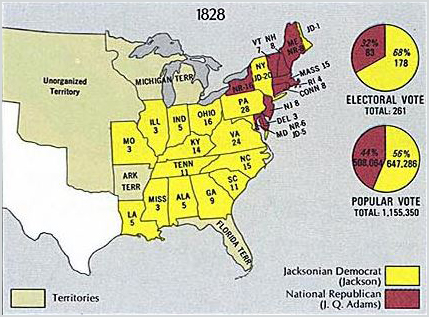
The 1828 Presidential
Election
 Here is more on the 1828 Election from the
Library of Congress.
Here is more on the 1828 Election from the
Library of Congress.
The Presidents of the
United States
Quick recap:
John Quincy Adams:
Brief Biography
|
July 11, 1767 |
Birth in
Braintree (Quincy), Massachusetts
|
|
February 12, 1775 |
Birth of his
future wife Louisa Catherine Johnson at London, England, to
Catherine Nuth, a British citizen, and Joshua Johnson who
hailed from Maryland.
|
|
June 17, 1775 |
Witnesses the
 Battle of Bunker Hill, part of
the
Battle of Bunker Hill, part of
the
 American Revolution, from the
top of Penn's Hill above the family farm.
American Revolution, from the
top of Penn's Hill above the family farm.
|
|
1778 |
Accompanies
his father to Europe. Studies at a private school in Paris,
France.
|
|
1780 |
Studies at the
University of Leyden (Leiden), Netherlands. Starts his now
famous diary that he will keep meticulously updated for the
next 60 years.
|
|
1781 |
Accompanies
Francis Dana, the
U.S. envoy to Russia, as his private secretary and French
interpreter.
|
|
1782 |
Joins his
father in Paris, where the negotiations of the Paris peace
treaties that will conclude the American Revolution, are
underway. John Quincy works as secretary for his father. See
more under
 Peace of Paris 1783.
Peace of Paris 1783.
|
|
1785 |
Returns to
Massachusetts, enters Harvard
|
|
1787 |
Graduates from
Harvard College, reads law at Newburyport under Theophilus Parsons
|
|
1790 |
Admitted to
the bar, practices in Boston, Mass.
|
|
1793 |
Writes a
series of articles in which he skillfully defends
George Washington's neutrality policy while facing Britain and
France going to war (See
 French Revolutionary
Wars, February 1, 1793). Washington is impressed.
French Revolutionary
Wars, February 1, 1793). Washington is impressed.
|
|
May 30, 1794 |
Appointed U.S.
Minister to the Netherlands by President
 George
Washington
George
Washington
|
|
November 19, 1794 |
 Jay Treaty between
Britain and the U.S. The French are not happy.
Jay Treaty between
Britain and the U.S. The French are not happy.
Meets his future wife in
England.
|
|
February - April 1796 |
Seven portrait
sittings for John Singleton Copley,
which resulted in this artwork:
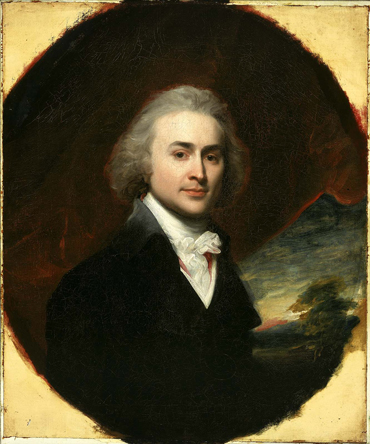
John Quincy
Adams 1796
Oil on canvas by John
Singleton Copley, whose wife asked him to paint it as a gift
to her friend, Abigail Adams.
Boston Museum of Fine
Arts
|
|
May 30, 1796 |
Appointed U.S.
Minister Plenipotentiary to Portugal by President Washington. Won't get to
work in Portugal, though, because a new assignment will come
his way before his departure.
|
|
September 17, 1796 |
 Washington's
Farewell Address
Washington's
Farewell Address
|
|
June 1, 1797 |
Appointed U.S.
Minister Plenipotentiary to Prussia by his father,
 John
Adams,
the new president since April 1797
John
Adams,
the new president since April 1797
|
June and July 1798
|
Alien and Sedition Acts
|
July 7, 1798 - September 30, 1800
|
 Quasi War with
France
Quasi War with
France
|
|
October 1, 1800 |
Spain and
France sign the secret
 Treaty of San Ildefonso, in which
Spain retrocedes
Louisiana
Treaty of San Ildefonso, in which
Spain retrocedes
Louisiana
|
|
November 30, 1800 |
JQA's brother
Charles dies.
|
|
1801 |
Father John
Adams loses his reelection.
 Thomas Jefferson is the new
President.
Thomas Jefferson is the new
President.
|
|
April 12, 1801 |
At Berlin
(Prussia), Louisa Catherine gives birth to their first son,
George Washington Adams.
|
|
September 4, 1801 |
John Quincy Adams returns to the States.
They arrive onboard the America in Philadelphia.
|
|
April 1802 |
Elected to the
Massachusetts Senate
|
|
November 1802 |
Runs
unsuccessfully for U.S. House of Representatives as Federalist.
|
|
1802, December 22 |
Gives the
annual
 Plymouth Oration
(PDF from the
Library of Congress Collection)
in which he quotes from Tacitus' Agricola, as one does, as
follows:
Plymouth Oration
(PDF from the
Library of Congress Collection)
in which he quotes from Tacitus' Agricola, as one does, as
follows:"Think of your forefathers!
Think of your posterity!"
Tacitus had it like this: "Proinde ituri in aciem
et maiores vestros et posteros cogitate."
Or, in other words: "Think, therefore, as you advance to battle, at once of your
ancestors and of your posterity."
But more to the point, JQA
concludes his oration by quoting the Irish philosopher George Berkeley:
"Westward the Star of
empire takes its way."
And adds,
"Let us all unite in ardent supplications to the founder of
nations and the builder of worlds, that what then was
prophecy may continue unfolding into history - that the
dearest hopes of the human race may not be extinguished in
disappointment, and that the last may prove the noblest
empire of time."
Berkeley had it like this:
"Westward the course of
empire takes its way;
The first four acts already past,
A fifth shall close the drama with the day:
Time's noblest offspring is the last."
From Berkeley's
On the Prospect of Planting Arts and Learning in America
(1752)
And as beautiful and eloquent as this is, this speech might
prompt us
to take a closer look at JQA's opinion on Native American
issues. See more under
 John Quincy Adams and the Indians
John Quincy Adams and the Indians
|
|
February 1803 |
Elected to the
U.S. Senate as member of the Federalist Party from
Massachusetts; serves from March 4, 1803 until his
resignation on June 8, 1808
|
|
April 30, 1803 |
 Louisiana
Purchase
Louisiana
Purchase
|
|
May 16, 1803 |
France and
Britain are at war. (See
 Napoleonic Wars)
Napoleonic Wars)
|
|
July 4, 1803 |
Birth of
second son John Adams II.
|
|
October 1803 |
Moves his
family to Washington.
|
|
1807 |
Breaks with
the Federalist Party. Final straw was the
 Chesapeake-Leopard affair,
which he considered a "wanton outrage." The Federalists were
pro-British.
Chesapeake-Leopard affair,
which he considered a "wanton outrage." The Federalists were
pro-British.
|
|
September 22, 1807 |
Supports the
 Embargo Act. No longer
a Federalist, this will cost him his Senate seat.
Embargo Act. No longer
a Federalist, this will cost him his Senate seat.
|
|
June 3, 1808 |
Adams'
successor is chosen six months early.
|
|
June 8, 1808 |
Knew he
wouldn't get re-elected to the Senate thanks to his support of the Embargo
Act, so he resigns. Back to being a lawyer.
|
|
February 12, 1809 |
 Abraham Lincoln born
Abraham Lincoln born
|
|
March 6, 1809 |
Nominated Minister
Plenipotentiary to Russia by the new president
 James Madison.
The Senate rejects the nomination.
James Madison.
The Senate rejects the nomination.
|
|
June 26, 1809 |
Nominated Minister
Plenipotentiary to Russia by Madison for the second time.
This time the Senate confirms.
|
|
June 27, 1809 |
Appointed
Minister Plenipotentiary to Russia by the new president
 James Madison.
JQA's wife Louisa Catherine and their youngest son, Charles
Francis will join him to Russia. George and John Jr. will
stay with their grandparents. JQA will serve at the Russian
court until 1814.
James Madison.
JQA's wife Louisa Catherine and their youngest son, Charles
Francis will join him to Russia. George and John Jr. will
stay with their grandparents. JQA will serve at the Russian
court until 1814.
|
|
August 1809 |
Birth of
daughter Louisa Catherine II. Sadly, she will die a year later.
|
|
June 12, 1812 |
The
 War of 1812 begins.
War of 1812 begins. |
|
|
|
|
June 24, 1812 |
Napoleon
launches his
 Invasion of Russia.
Invasion of Russia.
|
|
March 11, 1813 |
President
Madison accepts Russia's offer to negotiate between the U.S.
and Great Britain. The British will decline. Adams still at St. Petersburg.
|
|
August 1813 |
JQA's sister
Abigail dies of cancer.
|
|
November 4, 1813 |
Great Britain
rejects Russia's mediation offer, but proposes to negotiate
directly.
|
|
April 1, 1814 |
At St. Petersburg,
Adams gets notified that he is expected at Ghent (Belgium)
to negotiate a peace treaty for the War of 1812.
|
|
April 6, 1814 |
 Napoleon's
first abdication
Napoleon's
first abdication
|
|
April 28, 1814 |
Adams leaves
his post at St. Petersburg for Ghent. Wife and son stay put.
|
|
August 8, 1814 |
Peace
negotiations at Ghent begin.
|
|
August 24, 1814 |
The British
invade the city of Washington and burn all public buildings
including the Capitol and the White House.
 Check this event in the Timeline of
the War of 1812.
Check this event in the Timeline of
the War of 1812.
|
|
December 24, 1814 |
Co-signs the
 Treaty of Ghent.
Treaty of Ghent.
Adams sends for his
wife and youngest son, who are still in Russia, to reunite
with them in Paris. He
will stay for two months in France.
Adams, Gallatin, and Clay travel to London to
negotiate a trade treaty with Britain.
Clay and Gallatin return to
the States but Adams stays on as U.S. minister to Britain.
|
|
February 17, 1815 |
The
 War of 1812 ends.
War of 1812 ends. |
|
|
|
|
February 28, 1815 |
Appointed
envoy extraordinary and minister plenipotentiary to the
United Kingdom.
|
|
May 1815 |
JQA's sons
George and John join the family in the UK after nearly six
years of separation.
|
|
June 22, 1815 |
 Napoleon's
second and final abdication
Napoleon's
second and final abdication
|
|
July 3, 1815 |
Treaty of
commerce with Britain signed. Its official title: A Convention to Regulate the Commerce between the
Territories of The United States and of His Britannick Majesty.
This treaty was extended for
10 years by convention of October 20, 1818, and indefinitely
by convention of August 6, 1827.
Solid diplomatic work.
|
|
August 1, 1816 |
Excerpt from JQA's letter
to his father John Adams:
"Fiat justitia, pereat
coelum [Let justice be done though heaven fall]. My toast
would be, may
our country be always successful, but whether successful or
otherwise, always right."
|
|
March 4, 1817 |
President
 James
Monroe
inaugurated. His two terms will be referred to as the
"Era of Good Feelings."
James
Monroe
inaugurated. His two terms will be referred to as the
"Era of Good Feelings."
|
|
March 5, 1817 |
Monroe
appoints Adams Secretary of State.
|
|
May 14, 1817 |
Monroe recalls
Adams from London.
|
|
April 28, 1817 |
Rush-Bagot Agreement. To
keep peace on the border between Canada and the U.S., this
agreement directs that only one vessel per country is
allowed on Lake Champlain, one on Lake Ontario, and two on
the upper lakes.
|
|
July 4, 1817 |
Construction
of the Erie Canal begins at Rome, New York.
|
|
August 1817 |
Adams back in
the States. Richard Rush will be his successor as U.S.
minister to Britain (nominated and confirmed in December
1817.)
|
|
September 22, 1817 |
Secretary of State.
Last day on the job will be
March 3, 1825.
|
|
October 28, 1818 |
JQA's mother,
Abigail Adams, dies just two weeks before her 80th birthday.
|
|
1819 |
Signs the
 Purchase of Florida (also
called Adams-Onis Treaty or Transcontinental
Treaty)
Purchase of Florida (also
called Adams-Onis Treaty or Transcontinental
Treaty)
|
|
March 6, 1820 |
 Missouri Compromise
- Here is JQA's
Missouri Compromise
- Here is JQA's
 comment on the
subject from January 10, 1820.
comment on the
subject from January 10, 1820.
|
|
1820 |
Accidentally
got one vote in the 1820 presidential election. See
 JQA in Presidential Elections
JQA in Presidential Elections
|
|
December 2, 1823 |
 Monroe
Doctrine, a message to European powers to stop
eye-balling the Americas with colonizational intent. Monroe
Doctrine, a message to European powers to stop
eye-balling the Americas with colonizational intent.
|
|
April 17, 1824 |
The Russians
agree to stay north of today's southern
border of Alaska.
This treaty will be ratified in 1825, and thus become the
first treaty concluded between Russia and the United States.
|
|
1824 |
Runs against Andrew Jackson in a
 controversial presidential election.
controversial presidential election.
|
|
February 9, 1825 |
The House of
Representatives elects John Quincy Adams as the next
President of the United States.
|
|
March 4, 1825 |
Sixth
President of the U.S.
Chief Justice John Marshall administers the oath of office
inside the Hall of the House of Representatives at the
Capitol in Washington. |
|
|
|
|
Early Fall, 1825 |
JQA's last
visit with his father John Adams.
|
|
October 26, 1825 |
Construction
of the Erie Canal is finished.
|
|
December 6, 1825 |
JQA's first
Annual Message. Here is an excerpt:
While dwelling with
pleasing satisfaction upon the superior excellence of our
political institutions, let us not be unmindful
that liberty is power; that the nation blessed with the
largest portion of liberty must in proportion to its numbers
be the most powerful nation upon earth, and that the tenure
of power by man is, in the moral purposes of his Creator,
upon condition that it shall be exercised to ends of
beneficence, to improve the condition of himself and his
fellow men.
|
|
July 4, 1826 |
Today, the 50th anniversary of the
 Declaration of Independence
coincides with the death of two Founding Fathers: 83-year-old
Thomas Jefferson and JQA's 90-year-old father, John Adams.
Declaration of Independence
coincides with the death of two Founding Fathers: 83-year-old
Thomas Jefferson and JQA's 90-year-old father, John Adams.
|
|
1828 |
After losing
the 1828 election to Jackson (see
 JQA in Presidential Elections)
Adams will enjoy briefly the life of a private citizen.
JQA in Presidential Elections)
Adams will enjoy briefly the life of a private citizen.
|
|
March 3, 1829 |
Last day in office as U.S.
president |
|
|
|
|
April 30, 1829 |
JQA's eldest
son George dies.
|
|
May 28, 1830 |
Indian Removal Act
|
|
1830 |
As a
Republican, elected to the House of Representatives by the
Plymouth, Massachusetts, district by a landslide. Argues against slavery.
|
|
March 4, 1831 |
Twenty-second
Congress begins. JQA in the House of Representatives, serves
as chairman. He will be re-elected for every following Congress until
his death.
|
|
March 13, 1832 |
JQA's brother
Thomas Boylston dies.
|
|
1834 |
Becomes a Whig. Runs unsuccessfully for governor of Massachusetts
|
|
October 23, 1834 |
JQA's second
son John dies.
|
|
1836 |
Principal
force behind the endeavor to make the Smithsonian
Institution in Washington D.C. become a reality.
|
|
March 6, 1836 |
General
 Antonio López de Santa Anna
takes the
Antonio López de Santa Anna
takes the
 Alamo.
Alamo.
|
November 9, 1843
|
JQA lays the
cornerstone at the dedication of the Cincinnati observatory.
His last public speech.
|
April 25, 1846 - February 2, 1848
|
 Mexican-American War
Mexican-American War
|
|
February 21, 1848 |
Has a stroke
and collapses somewhat appropriately while speaking on the floor of the House in the U.S. Capitol
Building, Washington D.C.
|
|
February 23, 1848 |
Dies at Washington D.C.
|
|
May 14, 1852 |
Louisa
Catherine dies at Washington D.C. |
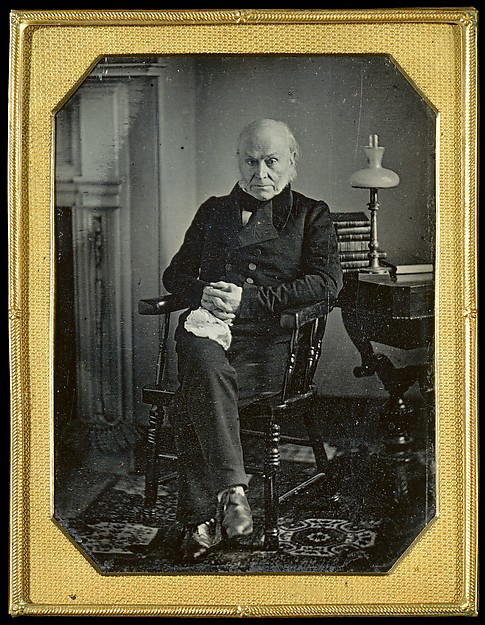
John Quincy Adams ca. 1843
The Metropolitan Museum of Art
From the Memoirs of
John Quincy Adams
Today, you can buy the Memoirs of
John Quincy Adams, comprising portions of his massive diary, for a
reasonable price.
Keeping in mind that Adams was famous
for his eloquence, the following entry might come as a surprise:
Washington, January 22nd, 1807
... Senate adjourned without taking the question. I spoke about
an hour; but the subject had been exhausted by Mr. Giles, and I
could only present some of his ideas in new lights. I should
have done better to remain silent. My defects of elocution are
incurable, and amidst so many better speakers, when the debates
are to be reported, I never speak without mortification.
The process of reasoning in my
mind is too slow for uninterrupted articulation. My
thoughts arise at first confused, and require time to
shape into a succession of sentences. Hence the transition from
thought to thought is awkward and inelegant, and expression
often fails me to accomplish a sentence commenced; so that I
often begin a thought with spirit and finish it with nonsense.
The chain of my argument often
escapes me, and when lost can seldom be retrieved. I then finish
as I can, without producing half the arguments I proposed before
I began to speak. These faults are so overpowering that I should
sink into perpetual silence, from mere impotence, were it not
that sometimes in ardor of debate, when my feelings are wound up
to a high tone, elocution pours itself along with unusual
rapidity, and I have passages which would not shame a good
speaker; this is the only thing that makes me tolerable to
others or to myself.
John Quincy Adams
and the Indians
After fighting slavery and promoting women's rights,
was Adams naturally drawn
to defending Native American rights?
The following is an excerpt from JQA's
 1802 Plymouth Oration:
1802 Plymouth Oration:
The Indian right of possession itself
stands with regard to the greatest part of the country, upon a
questionable foundation.
Their cultivated fields; their constructed
habitations; a space of ample sufficiency for their subsistence, and
whatever they had annexed to themselves by personal labor, was
undoubtedly by the laws of nature theirs.
But what is the right of a
huntsman to the forest of a thousand miles over which he has
accidentally ranged in quest of prey?
Penguin's History of the United
States of America notes:
The trouble with this formula was
that the Americans habitually ignored its distinctions. The Iroquois
and Cherokees were primarily farmers, but they were turned off their
lands just the same. It was so easy to pretend that they were savage
hunters.
What's the Purpose of
Government?
Europe, with a few partial and unhappy
exceptions, has enjoyed 10 years of peace, during which all her
Governments, what ever the theory of their constitutions may have
been, are successively taught to feel that the end of their
institution is the happiness of the people, and that the exercise of
power among men can be justified only by the blessings it confers
upon those over whom it is extended.
John Quincy Adams, First Annual
Message, December 6, 1825
See also the
 US Election
Map 1796-1968
US Election
Map 1796-1968
And maybe
 Governments in History
Governments in History
More History
|
|